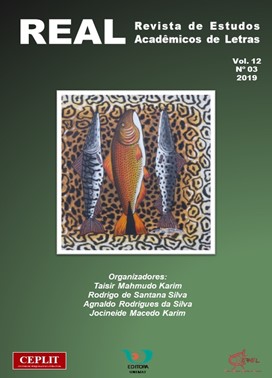BEYOND MECHANICAL SKILLS IN THE ENGLISH LANGUAGE CLASSROOM: WORKING WITH FAKE NEWS FROM THE DIGITAL LITERACIES PERSPECTIVE
Resumo
The advances in technology and the access to internet contribute to the spread of fake news, a phenomenon that is not new, but that is happening in a new environment – the cyberspace. Considering this reality, there have been debates related to how people (should) deal with information in the so-called post-truth era. Language is crucial in both the production and interpretation of fake news; English stands out in this process due to its number of users all over the world. One of the possibilities to deal with this phenomenon in the English language class is the digital literacies theory discussed in this paper which aims at analyzing an experience with fake news in the English classroom, focusing on possibilities in the development of digital literacies skills to deal with this kind of news. Regarding the methodology, this paper is a qualitative – analytical-interpretative – research. The analysis was based on Freeman’s (1998) four steps: naming, grouping, finding relationship, and displaying. Finally, I conclude that working with the digital literacies theory in the English classroom can help students deal with fake news, considering that it requires not only mechanical skills, but also reflection on how and why we interpret texts the way we do.
Downloads
Referências
BRAGA, D. B. Ambientes digitais: reflexões teóricas e práticas. São Paulo: Cortez, 2013.
FREEMAN, D. Doing Teacher Research: from inquiry to understanding. Boston:
Heinle Cencage Learning, 1998.
FERRAZ, D. M. Letramento visual: as imagens e as aulas de inglês. In: TAKAKI, N. H.; MACIEL, R. F. (Org.). Letramentos em terra de Paulo Freire. São Paulo: Pontes Editores, 2014. p. 255-270.
FLORES, P. J. Inferências falseadoras como base para a pós-verdade. Línguas e Letras, p. 20-32, 2017.
FOUCAULT, M. A ordem do discurso: aula inaugural no Collège de France, pronunciada em 2 de dezembro de 1970. Tradução de Laura Fraga de Almeida Sampaio. São Paulo: Edições Loyola, 2012.
GILSTER, P. Digital literacy. New York: Wiley Computer Publications, 1997.
JORDÃO, C. M. As lentes do discurso: letramento e criticidade no mundo digital. Trab. Ling. Aplic., v. 46, p. 19-29, 2007.
KALANTZIS, M.; COPE, B. On Globalisation and Diversity. Computers and Composition, v. 23, p. 402-411, 2006.
LANKSHEAR, C.; KNOBEL, M. Digital Literacy and Digital Literacies. Nordic Journal of Digital Literacy, p. 8–20, 2006-2016.
MENEZES DE SOUZA, L. M. T. O Professor de Inglês e os Letramentos no século XXI: métodos ou ética? In: JORDÃO, C.M.; MARTINEZ, J.Z; HALU, R.C. (Org.). Formação (Des) formatada: práticas com professores de língua inglesa. São Paulo: Pontes, 2011. p. 279-303.
NASCIMENTO, A. K. O. O ensino de língua inglesa sob o viés dos letramentos digitais. In: ZACCHI, V. J.; STELLA, P. R. Novos letramentos, formação de professores e o ensino de língua inglesa. Alagoas: Edufal, 2014. p. 53-73.
PENNYCOOK, G. et al. Prior exposure increases perceived accuracy of fake news. Journal of Experimental Psychology General, p. 1865-1880, 2018.
SANTAELLA, L. A pós-verdade é verdadeira ou falsa? 1. ed. São Paulo: Estação das Letras e Cores, 2018.
SANTAELLA, L. Comunicação ubíqua: repercussões na cultura e na educação. São Paulo: Paulus, 2013.
SANTAELLA, L. Temas e dilemas do pós-digital: a voz da política. São Paulo: Paulus,
SELWYN, N. Distrusting Educational Technology: critical questions for changing times. New York: Routledge, 2014.
Downloads
Publicado
Edição
Seção
Licença
Autores que publicam nesta revista concordam com os seguintes termos:
Os Autores mantém os direitos autorais e concedem à revista o direito de primeira publicação, com o trabalho simultaneamente licenciado sob aLicença Creative Commons Attribution que permite o compartilhamento do trabalho com reconhecimento da autoria e publicação inicial nesta revista.
Os Autores têm autorização para assumir contratos adicionais separadamente, para distribuição não-exclusiva da versão do trabalho publicada nesta revista (ex.: publicar em repositório institucional ou como capítulo de livro), com reconhecimento de autoria e publicação inicial nesta revista.
Os Autores têm permissão e são estimulados a publicar e distribuir seu trabalho online (ex.: em repositórios institucionais ou na sua página pessoal) a qualquer ponto antes ou durante o processo editorial, já que isso pode gerar alterações produtivas, bem como aumentar o impacto e a citação do trabalho publicado (Veja O Efeito do Acesso Livre).
